MGMT600 Assignment: Shared Value in Corporate Strategy Report
VerifiedAdded on 2022/08/19
|7
|1402
|11
Report
AI Summary
This report analyzes the concept of shared value within the context of corporate social responsibility (CSR), highlighting its increasing significance in modern business practices. It emphasizes the challenges companies face in a competitive global market and the importance of customer retention. The report focuses on H.Z. Heinz as a case study, detailing how the company implemented a shared value approach through its micronutrient campaign, distributing vitamin and mineral sachets to children in developing countries to combat malnutrition. This initiative not only enhanced Heinz's reputation but also improved its social ROI and corporate image. The report concludes that the application of shared value is crucial for successful CSR activities, influencing customer purchase intentions and fostering sustainable business practices. The report is based on a post-course assignment, meeting the requirements of 1000 to 1500 words, double-spaced, and APA referenced, as per the assignment brief focusing on ethical considerations and corporate citizenship.
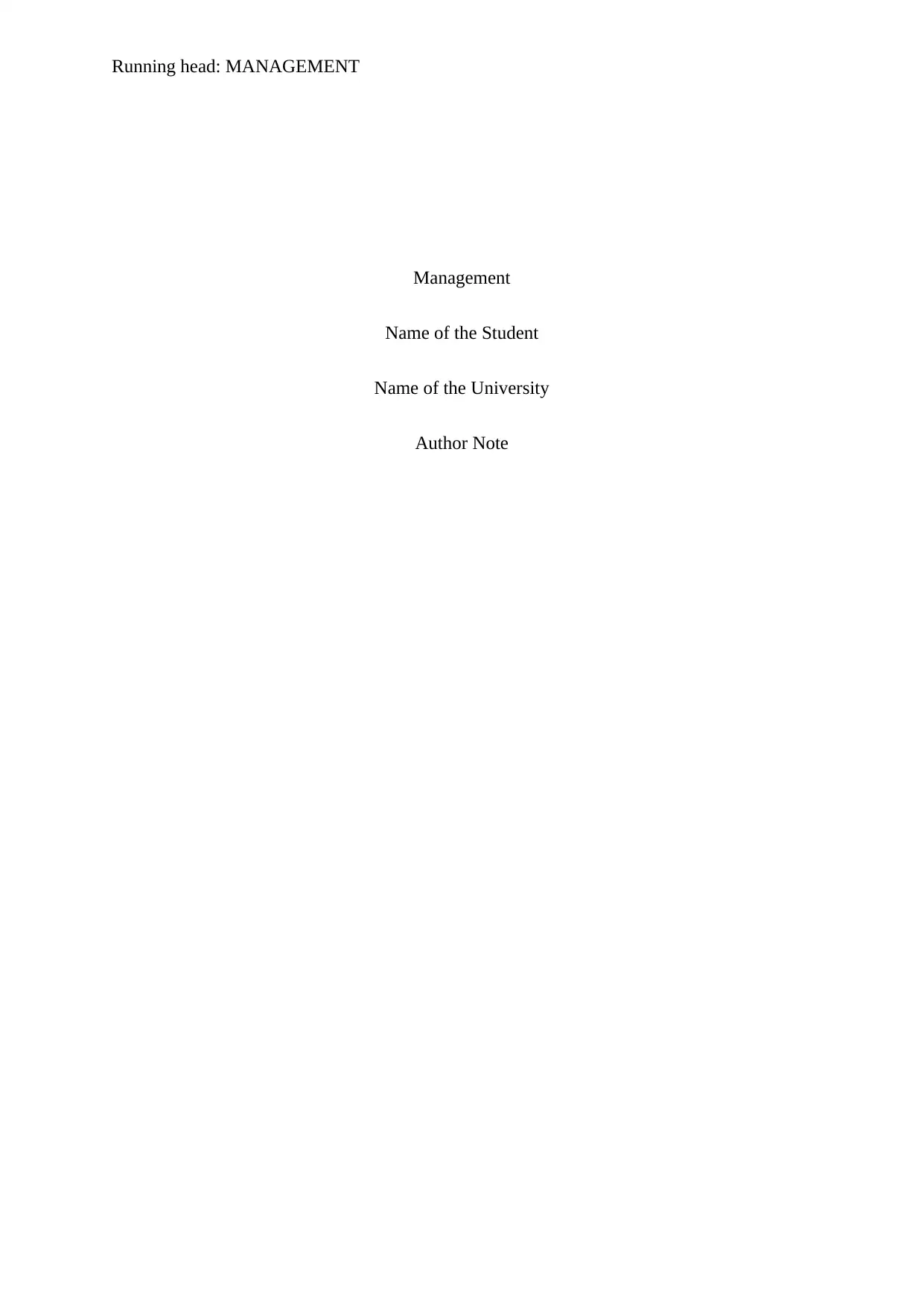
Running head: MANAGEMENT
Management
Name of the Student
Name of the University
Author Note
Management
Name of the Student
Name of the University
Author Note
Paraphrase This Document
Need a fresh take? Get an instant paraphrase of this document with our AI Paraphraser

1MANAGEMENT
Table of Contents
Introduction:...............................................................................................................................3
Discussion:.................................................................................................................................3
Conclusion:................................................................................................................................5
References:.................................................................................................................................7
Table of Contents
Introduction:...............................................................................................................................3
Discussion:.................................................................................................................................3
Conclusion:................................................................................................................................5
References:.................................................................................................................................7
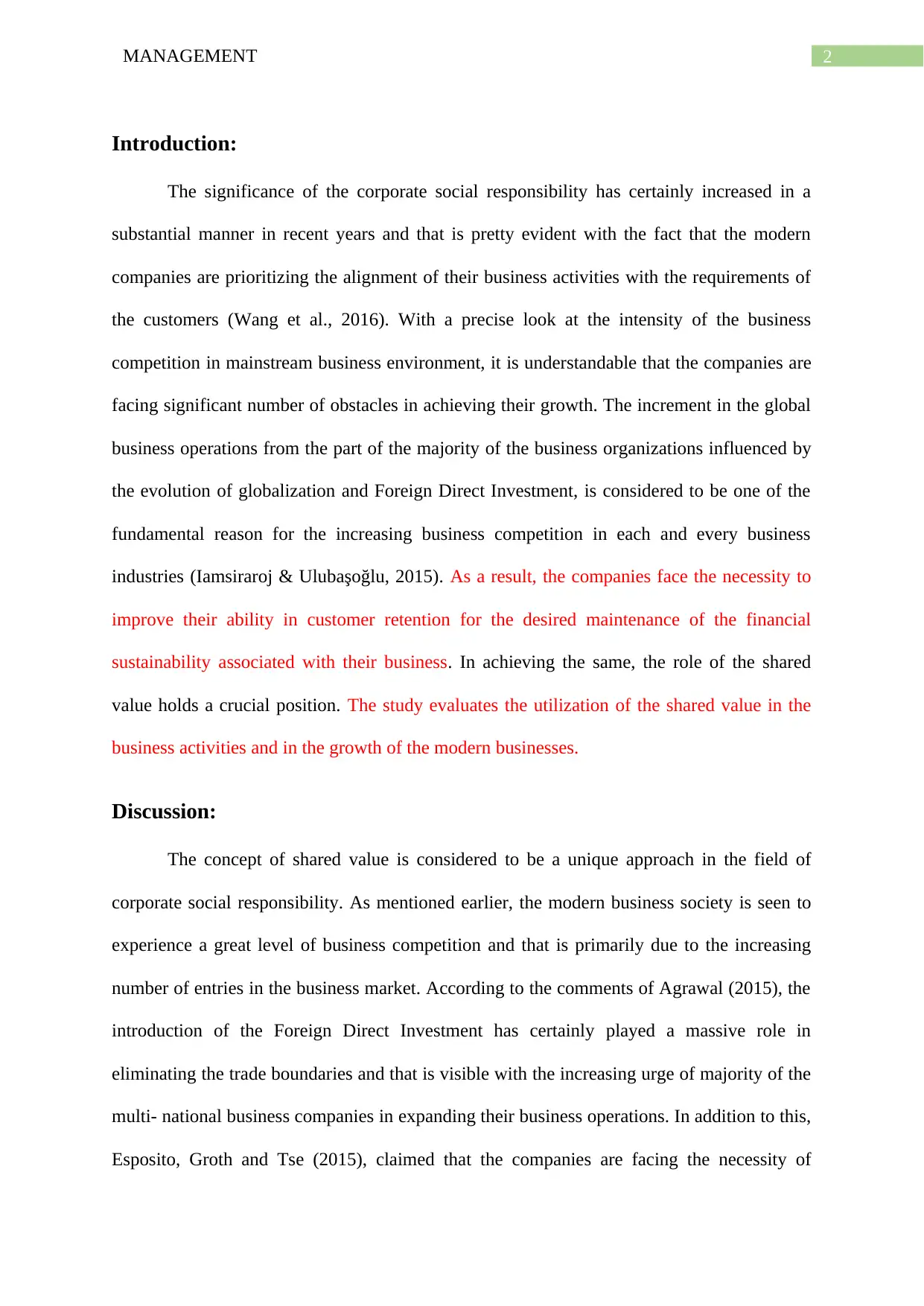
2MANAGEMENT
Introduction:
The significance of the corporate social responsibility has certainly increased in a
substantial manner in recent years and that is pretty evident with the fact that the modern
companies are prioritizing the alignment of their business activities with the requirements of
the customers (Wang et al., 2016). With a precise look at the intensity of the business
competition in mainstream business environment, it is understandable that the companies are
facing significant number of obstacles in achieving their growth. The increment in the global
business operations from the part of the majority of the business organizations influenced by
the evolution of globalization and Foreign Direct Investment, is considered to be one of the
fundamental reason for the increasing business competition in each and every business
industries (Iamsiraroj & Ulubaşoğlu, 2015). As a result, the companies face the necessity to
improve their ability in customer retention for the desired maintenance of the financial
sustainability associated with their business. In achieving the same, the role of the shared
value holds a crucial position. The study evaluates the utilization of the shared value in the
business activities and in the growth of the modern businesses.
Discussion:
The concept of shared value is considered to be a unique approach in the field of
corporate social responsibility. As mentioned earlier, the modern business society is seen to
experience a great level of business competition and that is primarily due to the increasing
number of entries in the business market. According to the comments of Agrawal (2015), the
introduction of the Foreign Direct Investment has certainly played a massive role in
eliminating the trade boundaries and that is visible with the increasing urge of majority of the
multi- national business companies in expanding their business operations. In addition to this,
Esposito, Groth and Tse (2015), claimed that the companies are facing the necessity of
Introduction:
The significance of the corporate social responsibility has certainly increased in a
substantial manner in recent years and that is pretty evident with the fact that the modern
companies are prioritizing the alignment of their business activities with the requirements of
the customers (Wang et al., 2016). With a precise look at the intensity of the business
competition in mainstream business environment, it is understandable that the companies are
facing significant number of obstacles in achieving their growth. The increment in the global
business operations from the part of the majority of the business organizations influenced by
the evolution of globalization and Foreign Direct Investment, is considered to be one of the
fundamental reason for the increasing business competition in each and every business
industries (Iamsiraroj & Ulubaşoğlu, 2015). As a result, the companies face the necessity to
improve their ability in customer retention for the desired maintenance of the financial
sustainability associated with their business. In achieving the same, the role of the shared
value holds a crucial position. The study evaluates the utilization of the shared value in the
business activities and in the growth of the modern businesses.
Discussion:
The concept of shared value is considered to be a unique approach in the field of
corporate social responsibility. As mentioned earlier, the modern business society is seen to
experience a great level of business competition and that is primarily due to the increasing
number of entries in the business market. According to the comments of Agrawal (2015), the
introduction of the Foreign Direct Investment has certainly played a massive role in
eliminating the trade boundaries and that is visible with the increasing urge of majority of the
multi- national business companies in expanding their business operations. In addition to this,
Esposito, Groth and Tse (2015), claimed that the companies are facing the necessity of
⊘ This is a preview!⊘
Do you want full access?
Subscribe today to unlock all pages.

Trusted by 1+ million students worldwide
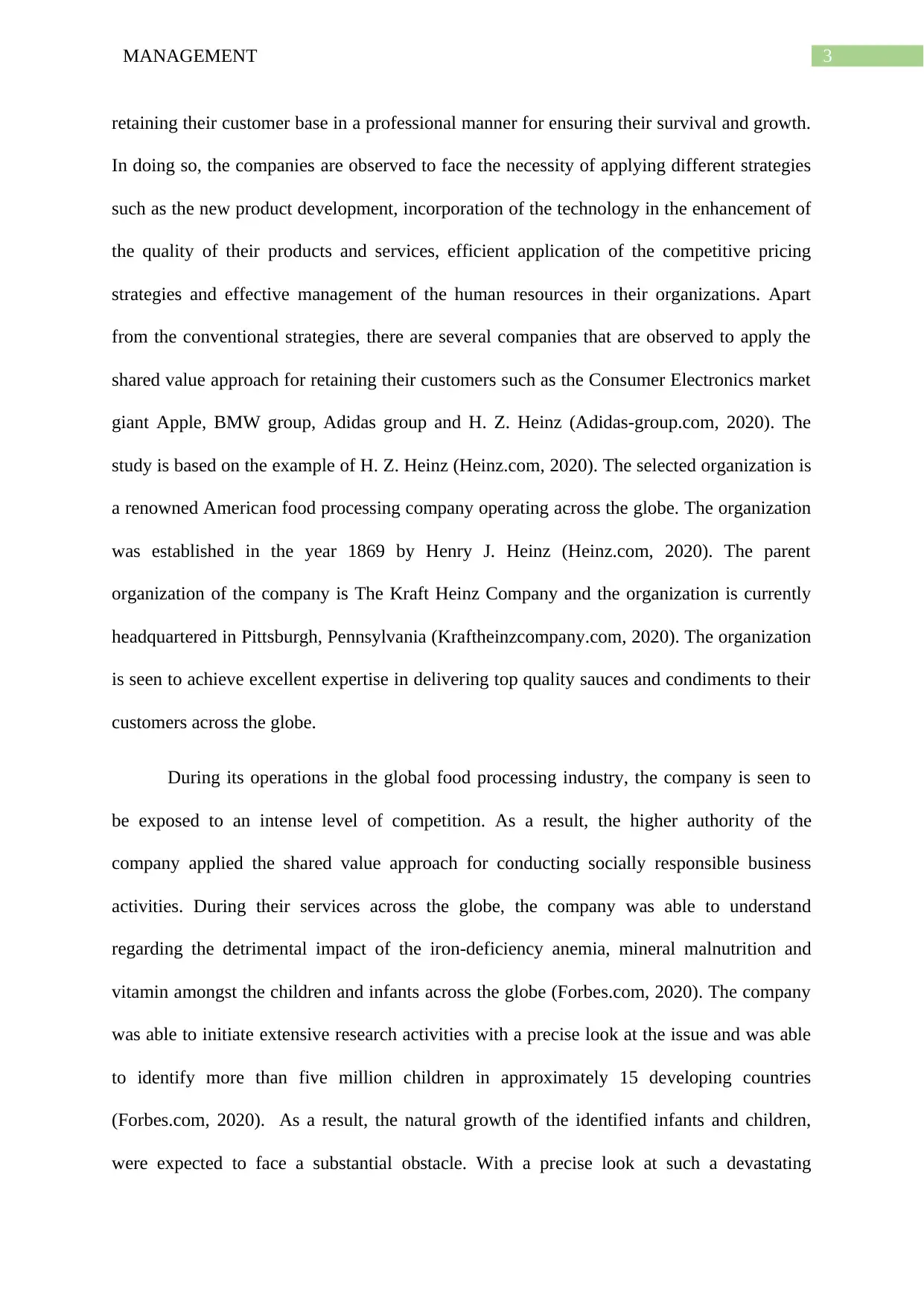
3MANAGEMENT
retaining their customer base in a professional manner for ensuring their survival and growth.
In doing so, the companies are observed to face the necessity of applying different strategies
such as the new product development, incorporation of the technology in the enhancement of
the quality of their products and services, efficient application of the competitive pricing
strategies and effective management of the human resources in their organizations. Apart
from the conventional strategies, there are several companies that are observed to apply the
shared value approach for retaining their customers such as the Consumer Electronics market
giant Apple, BMW group, Adidas group and H. Z. Heinz (Adidas-group.com, 2020). The
study is based on the example of H. Z. Heinz (Heinz.com, 2020). The selected organization is
a renowned American food processing company operating across the globe. The organization
was established in the year 1869 by Henry J. Heinz (Heinz.com, 2020). The parent
organization of the company is The Kraft Heinz Company and the organization is currently
headquartered in Pittsburgh, Pennsylvania (Kraftheinzcompany.com, 2020). The organization
is seen to achieve excellent expertise in delivering top quality sauces and condiments to their
customers across the globe.
During its operations in the global food processing industry, the company is seen to
be exposed to an intense level of competition. As a result, the higher authority of the
company applied the shared value approach for conducting socially responsible business
activities. During their services across the globe, the company was able to understand
regarding the detrimental impact of the iron-deficiency anemia, mineral malnutrition and
vitamin amongst the children and infants across the globe (Forbes.com, 2020). The company
was able to initiate extensive research activities with a precise look at the issue and was able
to identify more than five million children in approximately 15 developing countries
(Forbes.com, 2020). As a result, the natural growth of the identified infants and children,
were expected to face a substantial obstacle. With a precise look at such a devastating
retaining their customer base in a professional manner for ensuring their survival and growth.
In doing so, the companies are observed to face the necessity of applying different strategies
such as the new product development, incorporation of the technology in the enhancement of
the quality of their products and services, efficient application of the competitive pricing
strategies and effective management of the human resources in their organizations. Apart
from the conventional strategies, there are several companies that are observed to apply the
shared value approach for retaining their customers such as the Consumer Electronics market
giant Apple, BMW group, Adidas group and H. Z. Heinz (Adidas-group.com, 2020). The
study is based on the example of H. Z. Heinz (Heinz.com, 2020). The selected organization is
a renowned American food processing company operating across the globe. The organization
was established in the year 1869 by Henry J. Heinz (Heinz.com, 2020). The parent
organization of the company is The Kraft Heinz Company and the organization is currently
headquartered in Pittsburgh, Pennsylvania (Kraftheinzcompany.com, 2020). The organization
is seen to achieve excellent expertise in delivering top quality sauces and condiments to their
customers across the globe.
During its operations in the global food processing industry, the company is seen to
be exposed to an intense level of competition. As a result, the higher authority of the
company applied the shared value approach for conducting socially responsible business
activities. During their services across the globe, the company was able to understand
regarding the detrimental impact of the iron-deficiency anemia, mineral malnutrition and
vitamin amongst the children and infants across the globe (Forbes.com, 2020). The company
was able to initiate extensive research activities with a precise look at the issue and was able
to identify more than five million children in approximately 15 developing countries
(Forbes.com, 2020). As a result, the natural growth of the identified infants and children,
were expected to face a substantial obstacle. With a precise look at such a devastating
Paraphrase This Document
Need a fresh take? Get an instant paraphrase of this document with our AI Paraphraser
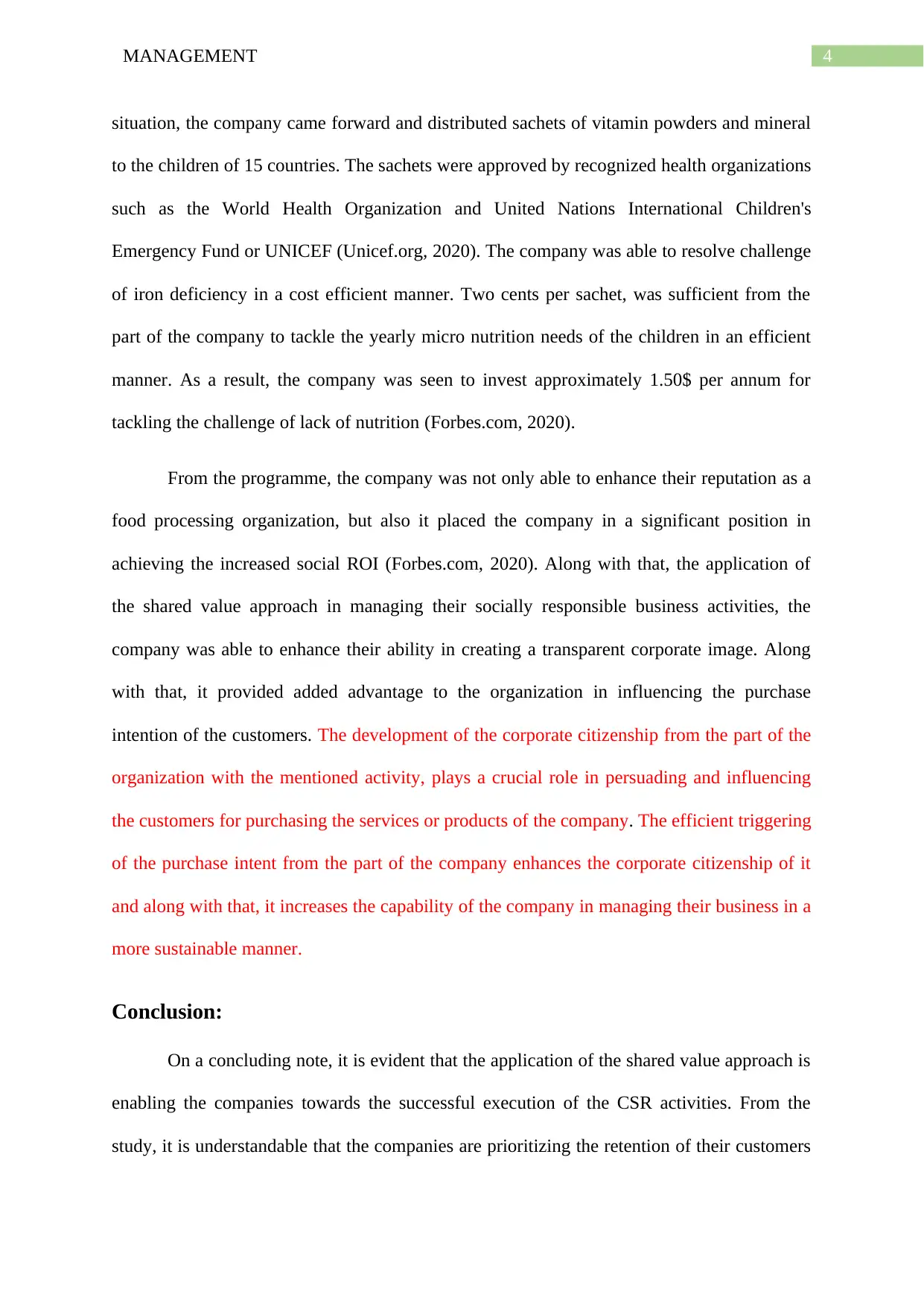
4MANAGEMENT
situation, the company came forward and distributed sachets of vitamin powders and mineral
to the children of 15 countries. The sachets were approved by recognized health organizations
such as the World Health Organization and United Nations International Children's
Emergency Fund or UNICEF (Unicef.org, 2020). The company was able to resolve challenge
of iron deficiency in a cost efficient manner. Two cents per sachet, was sufficient from the
part of the company to tackle the yearly micro nutrition needs of the children in an efficient
manner. As a result, the company was seen to invest approximately 1.50$ per annum for
tackling the challenge of lack of nutrition (Forbes.com, 2020).
From the programme, the company was not only able to enhance their reputation as a
food processing organization, but also it placed the company in a significant position in
achieving the increased social ROI (Forbes.com, 2020). Along with that, the application of
the shared value approach in managing their socially responsible business activities, the
company was able to enhance their ability in creating a transparent corporate image. Along
with that, it provided added advantage to the organization in influencing the purchase
intention of the customers. The development of the corporate citizenship from the part of the
organization with the mentioned activity, plays a crucial role in persuading and influencing
the customers for purchasing the services or products of the company. The efficient triggering
of the purchase intent from the part of the company enhances the corporate citizenship of it
and along with that, it increases the capability of the company in managing their business in a
more sustainable manner.
Conclusion:
On a concluding note, it is evident that the application of the shared value approach is
enabling the companies towards the successful execution of the CSR activities. From the
study, it is understandable that the companies are prioritizing the retention of their customers
situation, the company came forward and distributed sachets of vitamin powders and mineral
to the children of 15 countries. The sachets were approved by recognized health organizations
such as the World Health Organization and United Nations International Children's
Emergency Fund or UNICEF (Unicef.org, 2020). The company was able to resolve challenge
of iron deficiency in a cost efficient manner. Two cents per sachet, was sufficient from the
part of the company to tackle the yearly micro nutrition needs of the children in an efficient
manner. As a result, the company was seen to invest approximately 1.50$ per annum for
tackling the challenge of lack of nutrition (Forbes.com, 2020).
From the programme, the company was not only able to enhance their reputation as a
food processing organization, but also it placed the company in a significant position in
achieving the increased social ROI (Forbes.com, 2020). Along with that, the application of
the shared value approach in managing their socially responsible business activities, the
company was able to enhance their ability in creating a transparent corporate image. Along
with that, it provided added advantage to the organization in influencing the purchase
intention of the customers. The development of the corporate citizenship from the part of the
organization with the mentioned activity, plays a crucial role in persuading and influencing
the customers for purchasing the services or products of the company. The efficient triggering
of the purchase intent from the part of the company enhances the corporate citizenship of it
and along with that, it increases the capability of the company in managing their business in a
more sustainable manner.
Conclusion:
On a concluding note, it is evident that the application of the shared value approach is
enabling the companies towards the successful execution of the CSR activities. From the
study, it is understandable that the companies are prioritizing the retention of their customers
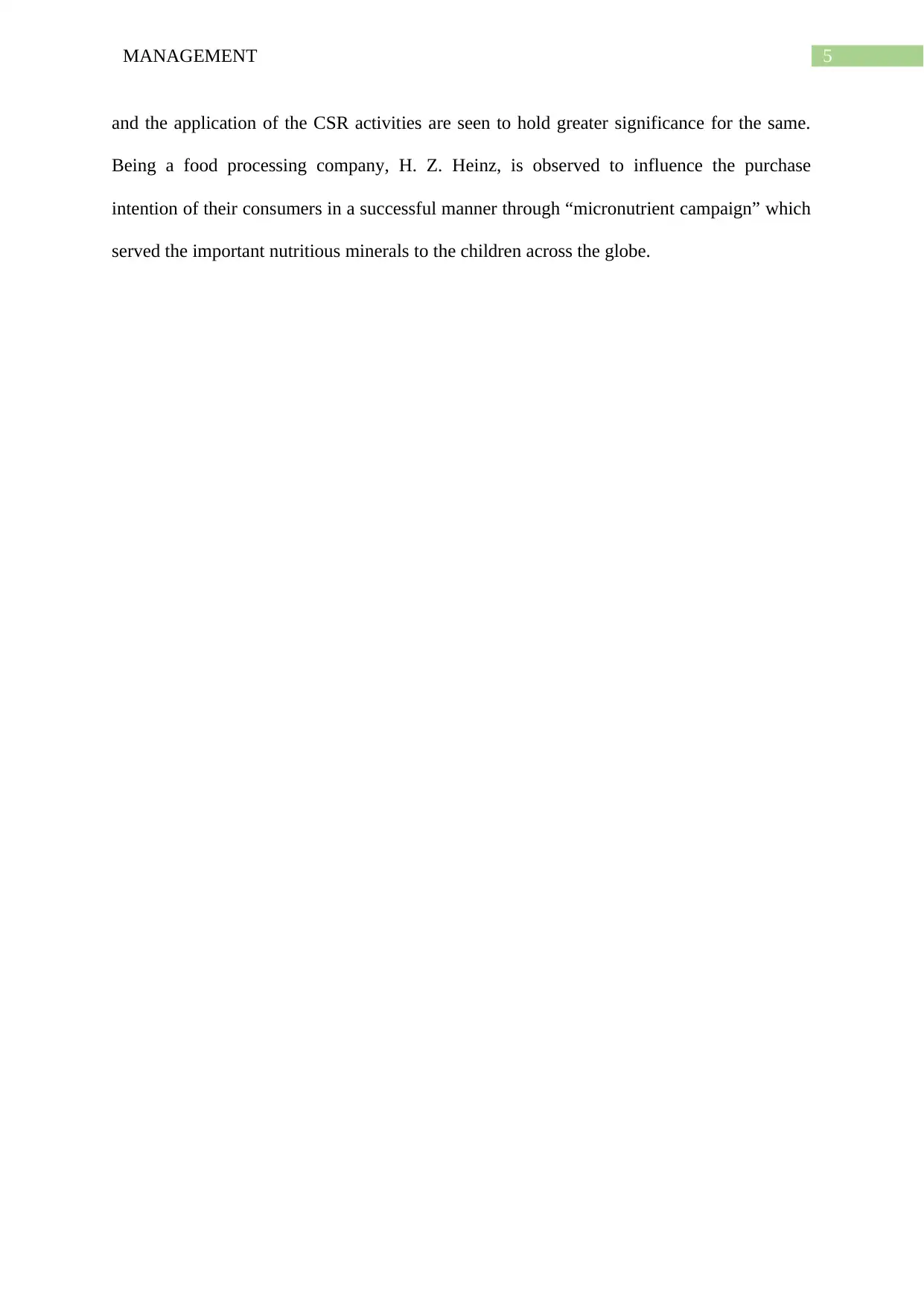
5MANAGEMENT
and the application of the CSR activities are seen to hold greater significance for the same.
Being a food processing company, H. Z. Heinz, is observed to influence the purchase
intention of their consumers in a successful manner through “micronutrient campaign” which
served the important nutritious minerals to the children across the globe.
and the application of the CSR activities are seen to hold greater significance for the same.
Being a food processing company, H. Z. Heinz, is observed to influence the purchase
intention of their consumers in a successful manner through “micronutrient campaign” which
served the important nutritious minerals to the children across the globe.
⊘ This is a preview!⊘
Do you want full access?
Subscribe today to unlock all pages.

Trusted by 1+ million students worldwide
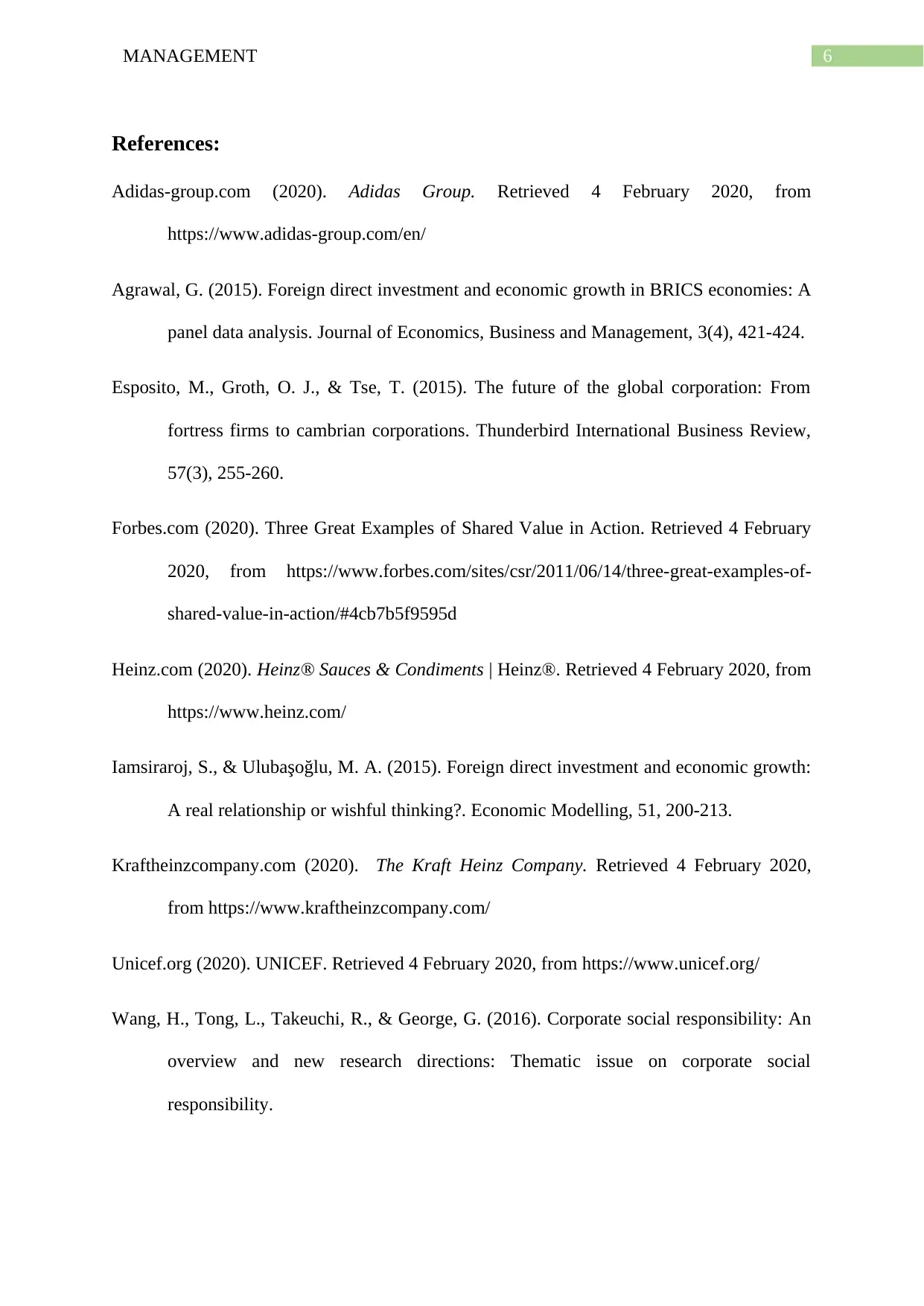
6MANAGEMENT
References:
Adidas-group.com (2020). Adidas Group. Retrieved 4 February 2020, from
https://www.adidas-group.com/en/
Agrawal, G. (2015). Foreign direct investment and economic growth in BRICS economies: A
panel data analysis. Journal of Economics, Business and Management, 3(4), 421-424.
Esposito, M., Groth, O. J., & Tse, T. (2015). The future of the global corporation: From
fortress firms to cambrian corporations. Thunderbird International Business Review,
57(3), 255-260.
Forbes.com (2020). Three Great Examples of Shared Value in Action. Retrieved 4 February
2020, from https://www.forbes.com/sites/csr/2011/06/14/three-great-examples-of-
shared-value-in-action/#4cb7b5f9595d
Heinz.com (2020). Heinz® Sauces & Condiments | Heinz®. Retrieved 4 February 2020, from
https://www.heinz.com/
Iamsiraroj, S., & Ulubaşoğlu, M. A. (2015). Foreign direct investment and economic growth:
A real relationship or wishful thinking?. Economic Modelling, 51, 200-213.
Kraftheinzcompany.com (2020). The Kraft Heinz Company. Retrieved 4 February 2020,
from https://www.kraftheinzcompany.com/
Unicef.org (2020). UNICEF. Retrieved 4 February 2020, from https://www.unicef.org/
Wang, H., Tong, L., Takeuchi, R., & George, G. (2016). Corporate social responsibility: An
overview and new research directions: Thematic issue on corporate social
responsibility.
References:
Adidas-group.com (2020). Adidas Group. Retrieved 4 February 2020, from
https://www.adidas-group.com/en/
Agrawal, G. (2015). Foreign direct investment and economic growth in BRICS economies: A
panel data analysis. Journal of Economics, Business and Management, 3(4), 421-424.
Esposito, M., Groth, O. J., & Tse, T. (2015). The future of the global corporation: From
fortress firms to cambrian corporations. Thunderbird International Business Review,
57(3), 255-260.
Forbes.com (2020). Three Great Examples of Shared Value in Action. Retrieved 4 February
2020, from https://www.forbes.com/sites/csr/2011/06/14/three-great-examples-of-
shared-value-in-action/#4cb7b5f9595d
Heinz.com (2020). Heinz® Sauces & Condiments | Heinz®. Retrieved 4 February 2020, from
https://www.heinz.com/
Iamsiraroj, S., & Ulubaşoğlu, M. A. (2015). Foreign direct investment and economic growth:
A real relationship or wishful thinking?. Economic Modelling, 51, 200-213.
Kraftheinzcompany.com (2020). The Kraft Heinz Company. Retrieved 4 February 2020,
from https://www.kraftheinzcompany.com/
Unicef.org (2020). UNICEF. Retrieved 4 February 2020, from https://www.unicef.org/
Wang, H., Tong, L., Takeuchi, R., & George, G. (2016). Corporate social responsibility: An
overview and new research directions: Thematic issue on corporate social
responsibility.
1 out of 7
Related Documents
Your All-in-One AI-Powered Toolkit for Academic Success.
+13062052269
info@desklib.com
Available 24*7 on WhatsApp / Email
![[object Object]](/_next/static/media/star-bottom.7253800d.svg)
Unlock your academic potential
Copyright © 2020–2026 A2Z Services. All Rights Reserved. Developed and managed by ZUCOL.




